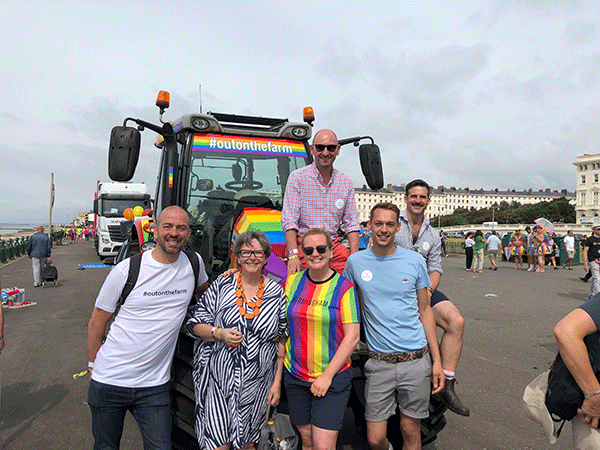I often get asked: ‘what’s life like as a gay farmer?’ I’ll be honest, for 95 per cent, it’s the same as being a straight farmer. The cattle are unphased. The brassicas and lettuce grow no differently.
The fact I can be quite so blasé about this is not only a sign of the incredible steps we have made as a society, but also a sign of how I have come to terms with it myself.
It’s 20 years since I came out, over half a lifetime ago now. While I can count on one hand the incidents of overt homophobia I have experienced, it has taken me the majority of those years to come to terms with it myself.
Growing up throughout the eighties there were no openly LGBT role models and it was a time of Section 28 (where any mention of homosexual relationships in schools was outlawed) and the AIDS epidemic.
Representations of LGBT people in TV and film were lazy stereotypes. In politics, openly gay campaigners for LGBT rights had their reputations smeared by candidates who would later admit to being LGBT themselves.
Closer to home, the farming community was the traditional, heterosexual, Church of England, white nuclear family. The husband did the farming, and the wife did, well, everything else.
There was little emotional maturity and any conversations regarding relationships were largely ignored with the assumption that sons would be farmers and daughters would marry farmers. There was simply no concept of not fitting the mold.
Rather than openly aggressive forms of homophobia, the age-old playground taunts of ‘you’re so gay’ forced every boy to ‘man up’, and to ‘stop being a pansy’. Although I don’t think this was just confined to growing up in the country.
You would think that today, in the 21st century, with such incredible representation in all walks of life, that there would be no stigma around being LGBT in farming. Yet still there are people, young and old, who are afraid to be themselves.
Some young people still think that in order to be happy they must leave rural life for bright city lights, which is true for some people, but others shouldn’t have to choose between being their best authentic selves, and the job they love.
It’s because of that I’ve been proud to work with Agrespect, an organisation that engages with some of the major organisations and corporations to help make the agriculture industry a more inclusive and diverse environment.

It works both to retain young talent in agriculture but also to promote it as a modern and diverse industry.
The Agrespect website also hosts stories from people all over the world sharing their experience of being LGBT and working in one way or another in agriculture.
As more people got in touch to share their stories it soon became clear there were more people out there than we imagined. Not just folk who sit on tractors all day; lawyers, agronomists, scientists, consultants, geologists, surveyors, and government advisors.
Regardless of where they came from or where they are now, a common theme was that the biggest obstacle to coming out was internal. Fear of rejection. And that is why visibility is Agrespect’s most important role.
Much of the homophobia within agriculture, like a lot of prejudice, is a result of ‘othering’. Regarding with suspicion someone who is different.
Hopefully with more LGBT representation across the board, not just in farming but public life in general, everyone will see that we actually have more in common than we have differences.












0 Comments